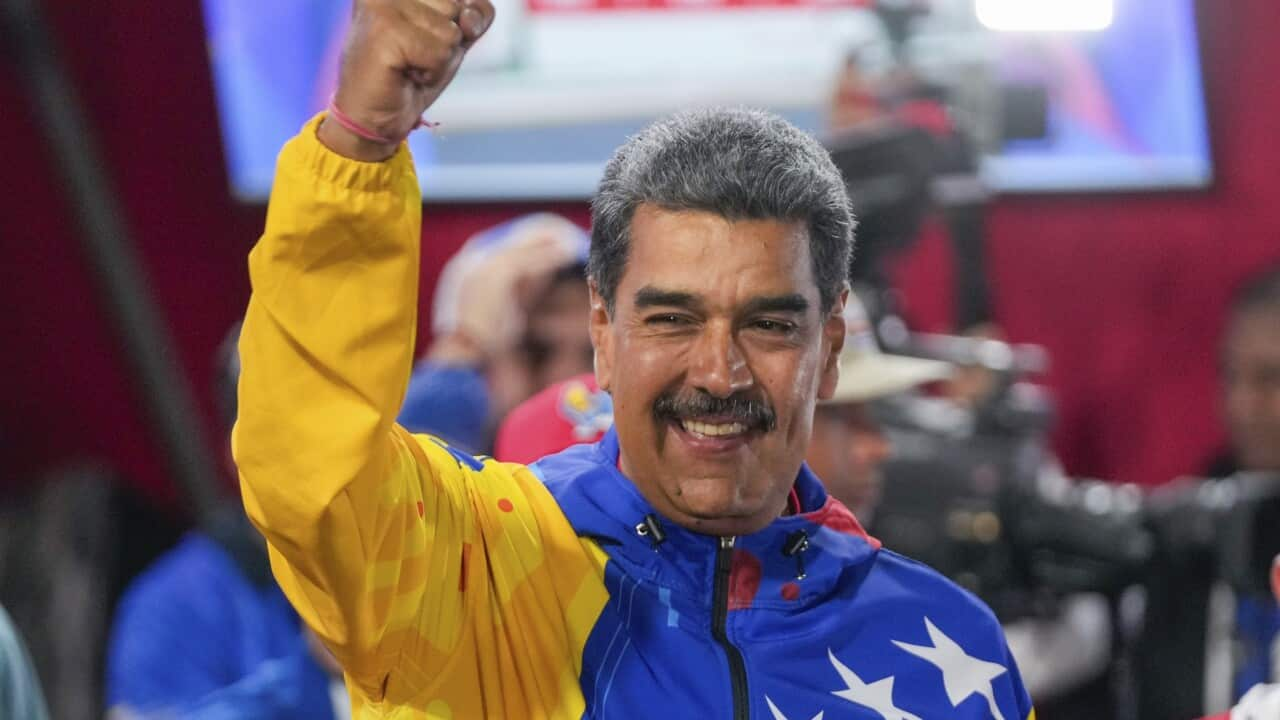Key Points
- Venezuela's electoral authority, loyal to the government, declared Maduro had won with 51.2 per cent of votes.
- Rival Edmundo González Urrutia, who had been leading in polls, had 44.2 per cent of votes.
- US secretary of state Antony Blinken said his country had "serious concerns" about the result announced.
Venezuela's President Nicolás Maduro won re-election with 51.2 per cent of votes cast Sunday, the electoral council announced, after a campaign tainted by claims of opposition intimidation and fears of fraud.
Elvis Amoroso, president of the National Electoral Council (CNE), the electoral body loyal to the government, told reporters that 44.2 per cent of votes had gone to opposition candidate Edmundo González Urrutia who had been leading in polls.
He said the results were based on 80 per cent of voting stations, marking an irreversible trend.
Independent polls had suggested Sunday's vote could bring an end to 25 years of 'Chavismo', the populist movement founded by Maduro's socialist predecessor and mentor, the late Hugo Chávez.
Maduro counts on a loyal electoral apparatus, military leadership and state institutions in a system of well-established political patronage.
A rising opposition
In seeking a third term, he faced his toughest challenge yet from González, a retired diplomat who was unknown to voters before being tapped in April as a last-minute stand-in for opposition powerhouse María Corina Machado.
Machado was blocked by the Maduro-controlled supreme court from running for any office for 15 years. The former politician swept the opposition's October primary with more than 90 per cent of the vote.

Edmundo González Urrutia was chosen as the opposition candidate after María Corina Machado was blocked from joining the presidential race. Source: AP / Matias Delacroix
Machado, who campaigned far and wide for her proxy, urged voters late Sunday to keep "vigil" at their polling stations in the "decisive hours" of counting amid widespread fears of fraud.
"The Venezuelans and the entire world know what happened," González said in his first remarks since the result was announced.
Maduro's popularity has plummeted
Authorities set Sunday's election to coincide with what would have been the 70th birthday of former president Hugo Chavez, the revered leftist firebrand who died of cancer in 2013, leaving his Bolivarian revolution in the hands of Maduro.
But Maduro and his United Socialist Party of Venezuela are more unpopular than ever among many voters who blame his policies for crushing wages, spurring hunger, crippling the oil industry and separating families due to migration.
In the once wealthy petro-state, GDP dropped by 80 per cent in a decade, pushing more than seven million of its 30 million citizens to emigrate.

Having taken office in 2013, Maduro is accused of locking up critics and harassing the opposition in a climate of rising authoritarianism. Source: AP / Ariana Cubillos
Economic sanctions from the United States seeking to force Maduro from power after his 2018 re-election — which the US and dozens of other countries condemned as illegitimate — only deepened the crisis.
US concerned about transparency of results
US secretary of state Antony Blinken said his country has "serious concerns" about the result announced by the council.
"We have serious concerns that the result announced does not reflect the will or the votes of the Venezuelan people," he said in Tokyo on Monday, shortly after the CNE announcement.
"It's critical that every vote be counted fairly and transparently, that the electoral authorities immediately share information with the opposition and independent observers without delay and that the electoral authorities publish the tabulation of votes.
"The international community is watching this very closely and will respond accordingly."










